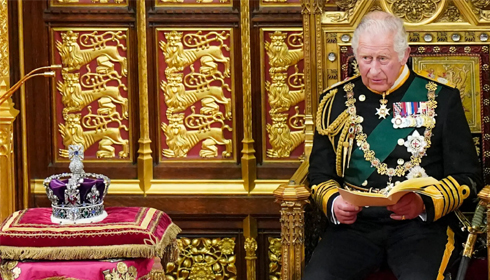
King Charles III's cancer diagnosis may help society to be more aware on cancers
The unexpected revelation of King Charles III's cancer diagnosis recently has sent shockwaves through Buckingham Palace and beyond, challenging centuries-old norms of secrecy surrounding the health of British monarchs.
The announcement came as the 75-year-old monarch underwent treatment for an enlarged prostate, revealing a "separate issue of concern" that turned out to be a form of cancer. While Buckingham Palace has not disclosed the specific type or location of the cancer, it clarified that it is not prostate cancer. King Charles has already initiated treatment and has been advised to step back from public-facing duties during this period.
The rarity of such disclosures breaks from the historical norm of British monarchs maintaining silence about their health. In contrast to his late mother, Queen Elizabeth II, known for the maxim "never complain, never explain," King Charles has chosen a more open approach. The palace's statement emphasised that the decision to share his diagnosis aims to prevent speculation and contribute to public understanding, particularly for those affected by cancer globally.
The news has ignited discussions about the implications of this departure from tradition, with some applauding King Charles's openness while others emphasise the need for more transparency, given his role in the media-saturated age.
The palace statement expressed hope that sharing the news would assist public understanding, a sentiment echoed by patient advocates reporting a surge in visits to cancer information pages.
Former royal press secretary Simon Lewis notes that King Charles's approach aligns with his style as a monarch, highlighting the evolving nature of royal communication in today's world. The palace's move to control information in the face of social media and misinformation underscores the challenges of navigating public disclosure in the digital age.
While the specifics of King Charles III's cancer remain undisclosed, the unprecedented nature of this revelation initiates a new chapter in the intersection of royal health and public awareness, potentially influencing global conversations on cancer awareness, early detection, and the importance of regular medical checks.
In a recent statement, the British monarch expressed gratitude to those who wished him well.
"I would like to express my most heartfelt thanks for the many messages of support and good wishes I have received in recent days," he said in a statement released by Buckingham Palace recently
"As all those who have been affected by cancer will know, such kind thoughts are the greatest comfort and encouragement," the statement read.
"It is equally heartening to hear how sharing my own diagnosis has helped promote public understanding and shine a light on the work of all those organisations which support cancer patients and their families across the UK and wider world. My lifelong admiration for their tireless care and dedication is all the greater as a result of my own personal experience," it added.
Cancer, a formidable adversary that affects millions worldwide, thrives in silence and ignorance and by openly discussing his diagnosis, King Charles III has not only demonstrated vulnerability but also spotlighted the urgency of addressing this global health challenge. The disclosure shatters long-held taboos, inviting individuals from all walks of life to confront the realities of cancer and consider the value of regular health screenings.
One of the key takeaways from this unprecedented move is the spotlight it places on the significance of early detection in cancer treatment. King Charles's diagnosis during routine medical assessments underscores the potential benefits of proactive health monitoring as early detection allows for more effective treatment interventions, often increasing the chances of successful outcomes.
The impact of the disclosure goes beyond the confines of Buckingham Palace, reaching people globally who are grappling with their health or supporting loved ones through similar challenges. The King's openness serves as a beacon, encouraging individuals to prioritize their health, schedule regular check-ups, and be attuned to their bodies.
As the world navigates the complexities of modern healthcare, King Charles III's disclosure becomes a poignant reminder that cancer does not discriminate based on status or privilege. The shared human experience of facing health challenges is universal, and the King's openness paves the way for a more compassionate and informed society.
Finally, King Charles III's decision to disclose his cancer diagnosis is more than a personal revelation; it is a call to action and by leveraging his platform to spark conversations around cancer awareness and early detection, the King has the potential to positively influence public health outcomes. The ripple effect of this disclosure may empower individuals to prioritise their well-being, leading to a more vigilant and health-conscious society.